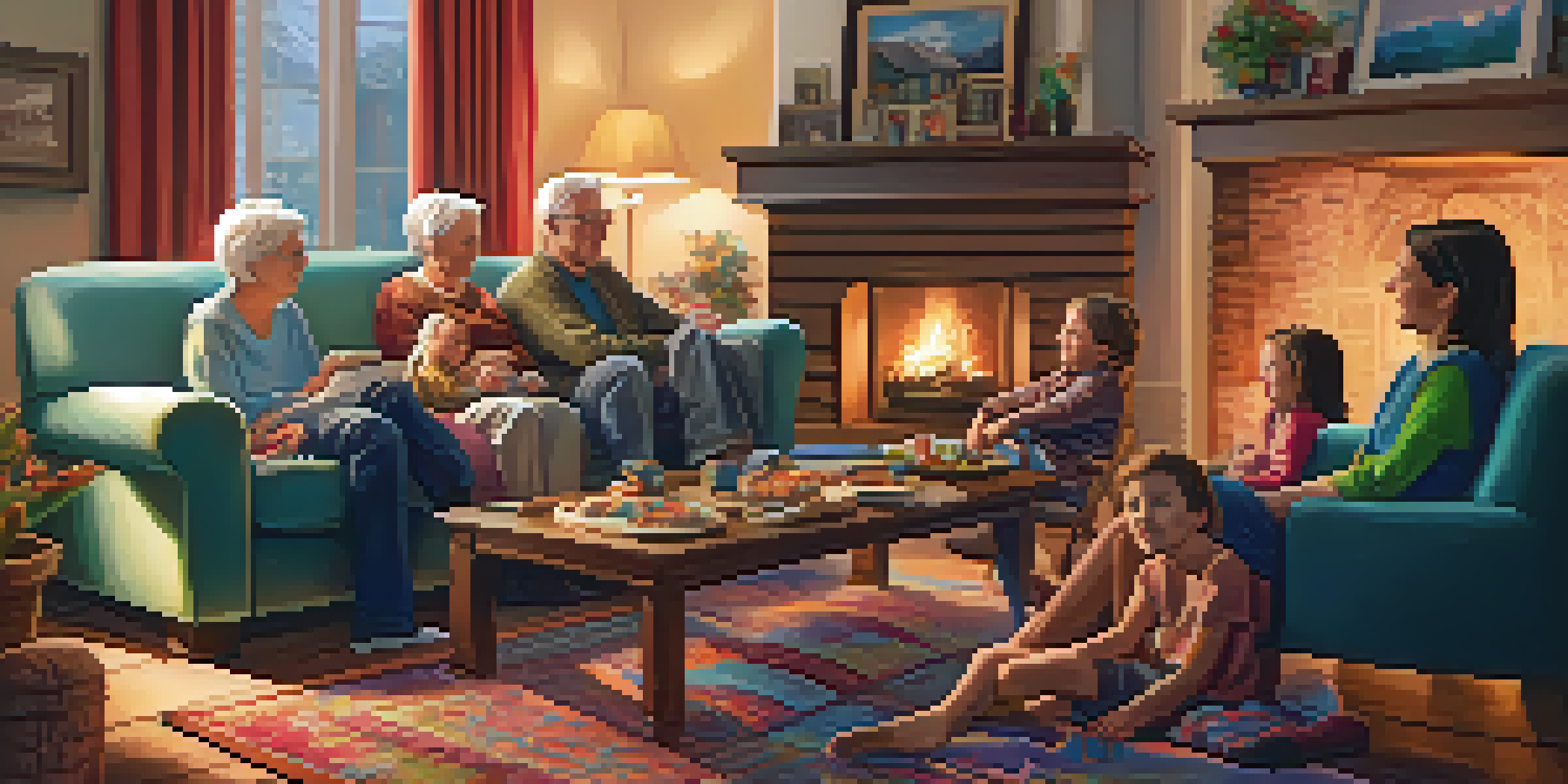Creating a Legacy: The Importance of Storytelling for Seniors

The Power of Storytelling in Preserving Memories
Storytelling has an incredible power to preserve memories, especially for seniors. It allows individuals to reflect on their life experiences, capturing significant moments that shape who they are. By sharing these stories, they can create a tapestry of their lives, making it easier for future generations to understand their heritage.
Stories are the connective tissue of our lives. They create the fabric of our families and communities.
When seniors tell their stories, they not only document their past but also breathe life into family history. This act of storytelling can spark curiosity and connection among family members, fostering a sense of belonging. As stories are passed down, they become cherished heirlooms that enrich family narratives.
Moreover, storytelling encourages emotional expression, helping seniors process their feelings and experiences. This can be particularly beneficial for those facing challenges like loneliness or loss, as sharing their journey can be cathartic and uplifting.
Building Connections Through Shared Experiences
One of the most beautiful aspects of storytelling is its ability to create connections. When seniors share their experiences, they often find common ground with others, fostering empathy and understanding. This can be particularly important in communities where seniors may feel isolated or disconnected.

For example, a senior might recount their childhood memories during a community event, sparking conversations with younger attendees who can relate to similar experiences. These shared moments not only bridge generational gaps but also strengthen community ties.
Storytelling Preserves Family History
Sharing stories allows seniors to document their past, creating a rich tapestry of family memories that future generations can cherish.
In essence, storytelling helps build a sense of community, reminding us that our experiences—while unique—often resonate with others. This shared understanding can pave the way for new friendships and support networks.
Encouraging Creativity and Self-Expression
Storytelling isn't just about recounting events; it's also a powerful form of creative expression. Seniors can explore their imagination and creativity while narrating their life stories, whether through writing, oral storytelling, or even visual arts. This creative process can be immensely fulfilling and invigorating.
We all have stories to tell, and the world needs to hear them.
Engaging in storytelling can stimulate cognitive functions and enhance mental agility. By organizing thoughts and crafting narratives, seniors exercise their minds, which can lead to improved memory retention and cognitive health.
Additionally, this creative outlet provides a platform for seniors to express their individuality. Each story is a reflection of their unique voice, experiences, and perspectives, allowing them to share their essence with the world.
The Role of Technology in Modern Storytelling
In today's digital age, technology plays a vital role in how stories are shared and preserved. Seniors can utilize various platforms like blogs, social media, and video-sharing sites to reach a broader audience. This accessibility not only enhances their storytelling experience but also fosters interactivity.
For instance, a senior might start a YouTube channel to share their life stories or create a digital scrapbook to document their family history. These modern tools allow them to engage with family and friends, even if they are miles apart.
Building Connections Through Stories
Storytelling fosters empathy and understanding, creating connections among seniors and between generations in communities.
Moreover, technology can help preserve stories for future generations. Digital archives can keep narratives alive, ensuring that their legacy continues to be heard and cherished by loved ones long after they are gone.
Therapeutic Benefits of Storytelling for Seniors
Beyond creating legacies, storytelling offers therapeutic benefits for seniors. Sharing their experiences can serve as a form of therapy, allowing them to process emotions and reflect on their lives. This can be especially valuable for those grappling with grief, anxiety, or depression.
Engaging in storytelling can also boost self-esteem and confidence. When seniors share their stories with others, they often receive validation and appreciation, reinforcing their sense of worth and identity.
Additionally, storytelling promotes socialization, reducing feelings of loneliness. It encourages seniors to connect with others, fostering conversations that can lead to friendships and a stronger support network.
Creating Family Traditions Through Storytelling
Storytelling can also be a wonderful way to establish family traditions. By sharing stories during family gatherings or holidays, seniors can create rituals that strengthen family bonds. These traditions become a cherished part of family legacy, passed down through generations.
Imagine a family gathering where grandparents share tales from their youth, sparking laughter and nostalgia. Such moments not only entertain but also teach younger generations about their roots and values.
Therapeutic Benefits of Sharing
Engaging in storytelling helps seniors process emotions, boosts self-esteem, and reduces feelings of loneliness through socialization.
As these traditions are upheld, they instill a sense of identity and continuity within the family. Storytelling thus becomes a thread that weaves family members closer together, enhancing the fabric of their shared history.
Encouraging Future Generations to Share Their Stories
As seniors take the time to share their stories, it's essential to encourage future generations to do the same. By fostering an environment where storytelling is valued, families can create a culture of communication and connection. This not only benefits the current generation but also enriches the lives of those yet to come.
Younger family members can learn from the wisdom of their elders, gaining insights that can guide them through their own life experiences. This exchange of stories creates a beautiful cycle of sharing and learning.

Encouraging storytelling among all ages ensures that family legacies remain vibrant and dynamic. It reminds us that every individual has a unique story worth telling, contributing to the rich tapestry of our shared human experience.